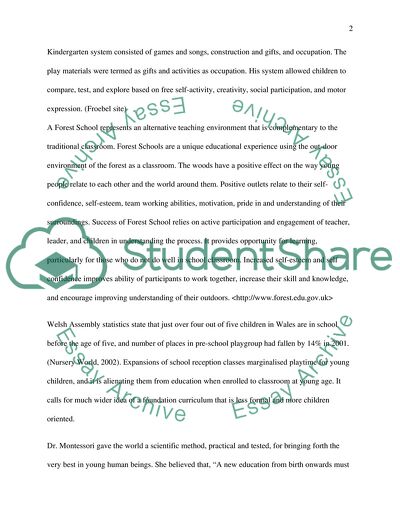
- Home
- Free Samples
- Premium Essays
- Editing Services
- Extra Tools
- Essay Writing Help
- About Us
- Studentshare
- Subjects
- Miscellaneous
- Identify effective teaching and learning methodology for children under 5 years some of it will be 0-7. I have to make references to a range of approaches and
Identify effective teaching and learning methodology for children under 5 years some of it will be 0-7. I have to make references to a range of approaches and - Essay Example

- Subject: Miscellaneous
- Type: Essay
- Level: Undergraduate
- Pages: 4 (1000 words)
- Downloads: 0
- Author: brentcole
Extract of sample "Identify effective teaching and learning methodology for children under 5 years some of it will be 0-7. I have to make references to a range of approaches and"
The purpose of pre-schools are to enable children to be happy and to learn positive attitudes, acquire confidence, and relate constructively and harmoniously to other children through focussing on their social, physical, interpersonal, and moral development. Kindergarten and primary classrooms are stimulating and exciting places where a child gets the opportunity to learn social and academic skills through active involvement with other children, teachers, as well as adults. There are different opinions as to what is the right age for schooling.
However, the approaches for pre-schooling propagated by Maria Montessori, Rudolf Steiner , and Freidrich Foebel are still relevant today. Friedrich Froebel stresses that the individuality and ability of each child should be treated with importance of creating a happy and harmonious environment in which he or she can grow. The value of self-activity and play are foundations in which integrated development of the whole person can be built. He believes that humans are essentially productive and creative, and that fulfilment comes through developing these in harmony with God and the world.
His vision was to stimulate an appreciation and live for children, to provide a new but small world for children to play with their age group and experience their first gentle taste of independence. His Kindergarten system consisted of games and songs, construction and gifts, and occupation. The play materials were termed as gifts and activities as occupation. His system allowed children to compare, test, and explore based on free self-activity, creativity, social participation, and motor expression.
(Froebel site) A Forest School represents an alternative teaching environment that is complementary to the traditional classroom. Forest Schools are a unique educational experience using the out-door environment of the forest as a classroom. The woods have a positive effect on the way young people relate to each other and the world
...Download file to see next pages Read More
- TERMS & CONDITIONS
- PRIVACY POLICY
- COOKIES POLICY